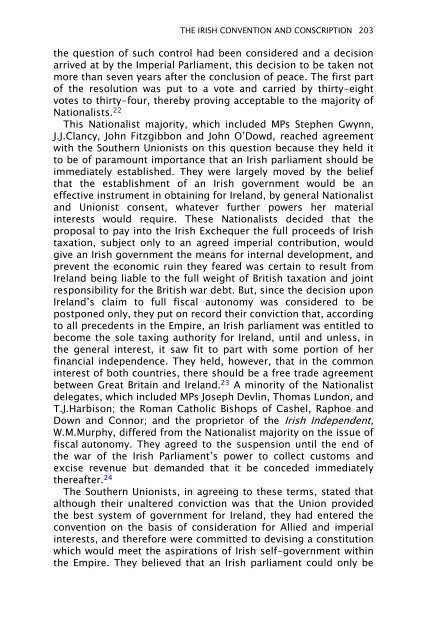Dividing Ireland: World War I and Partition
Dividing Ireland: World War I and Partition
Dividing Ireland: World War I and Partition
Create successful ePaper yourself
Turn your PDF publications into a flip-book with our unique Google optimized e-Paper software.
THE IRISH CONVENTION AND CONSCRIPTION 203<br />
the question of such control had been considered <strong>and</strong> a decision<br />
arrived at by the Imperial Parliament, this decision to be taken not<br />
more than seven years after the conclusion of peace. The first part<br />
of the resolution was put to a vote <strong>and</strong> carried by thirty-eight<br />
votes to thirty-four, thereby proving acceptable to the majority of<br />
Nationalists. 22<br />
This Nationalist majority, which included MPs Stephen Gwynn,<br />
J.J.Clancy, John Fitzgibbon <strong>and</strong> John O’Dowd, reached agreement<br />
with the Southern Unionists on this question because they held it<br />
to be of paramount importance that an Irish parliament should be<br />
immediately established. They were largely moved by the belief<br />
that the establishment of an Irish government would be an<br />
effective instrument in obtaining for <strong>Irel<strong>and</strong></strong>, by general Nationalist<br />
<strong>and</strong> Unionist consent, whatever further powers her material<br />
interests would require. These Nationalists decided that the<br />
proposal to pay into the Irish Exchequer the full proceeds of Irish<br />
taxation, subject only to an agreed imperial contribution, would<br />
give an Irish government the means for internal development, <strong>and</strong><br />
prevent the economic ruin they feared was certain to result from<br />
<strong>Irel<strong>and</strong></strong> being liable to the full weight of British taxation <strong>and</strong> joint<br />
responsibility for the British war debt. But, since the decision upon<br />
<strong>Irel<strong>and</strong></strong>’s claim to full fiscal autonomy was considered to be<br />
postponed only, they put on record their conviction that, according<br />
to all precedents in the Empire, an Irish parliament was entitled to<br />
become the sole taxing authority for <strong>Irel<strong>and</strong></strong>, until <strong>and</strong> unless, in<br />
the general interest, it saw fit to part with some portion of her<br />
financial independence. They held, however, that in the common<br />
interest of both countries, there should be a free trade agreement<br />
between Great Britain <strong>and</strong> <strong>Irel<strong>and</strong></strong>. 23 A minority of the Nationalist<br />
delegates, which included MPs Joseph Devlin, Thomas Lundon, <strong>and</strong><br />
T.J.Harbison; the Roman Catholic Bishops of Cashel, Raphoe <strong>and</strong><br />
Down <strong>and</strong> Connor; <strong>and</strong> the proprietor of the Irish Independent,<br />
W.M.Murphy, differed from the Nationalist majority on the issue of<br />
fiscal autonomy. They agreed to the suspension until the end of<br />
the war of the Irish Parliament’s power to collect customs <strong>and</strong><br />
excise revenue but dem<strong>and</strong>ed that it be conceded immediately<br />
thereafter. 24<br />
The Southern Unionists, in agreeing to these terms, stated that<br />
although their unaltered conviction was that the Union provided<br />
the best system of government for <strong>Irel<strong>and</strong></strong>, they had entered the<br />
convention on the basis of consideration for Allied <strong>and</strong> imperial<br />
interests, <strong>and</strong> therefore were committed to devising a constitution<br />
which would meet the aspirations of Irish self-government within<br />
the Empire. They believed that an Irish parliament could only be








